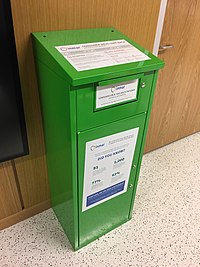
Photo from wikipedia
Background Unused medicines can be stored by many people at their places of residence and houses for later use. This study evaluated knowledge, and attitudes regarding unused and expired medicines… Click to show full abstract
Background Unused medicines can be stored by many people at their places of residence and houses for later use. This study evaluated knowledge, and attitudes regarding unused and expired medicines and explored medicine storage and disposal practices among selected households in the Kathmandu valley, Nepal. Method A cross-sectional study with a two-stage cluster survey design was done using a semi-structured questionnaire from April to October 2021. The sample size (total number of households) after adjusting for design effect and non-response rate was 210 and the study population was the household heads. Simple random sampling was done to select clusters during the first stage and systematic random sampling to select households during the second stage. Descriptive statistics and t-test/one-way ANOVA were used to compare the respondents’ average knowledge scores. Practice variables were presented using frequency distribution. Results Around half the respondents were from the Kathmandu district, nearly 20% were from Bhaktapur and 30% were from Lalitpur. Nearly two-thirds were male and about 25% had a bachelor’s degree. Nearly 90% of respondents agreed that storage of excess medicines at home may promote self-medication. Similarly, 97.6% of respondents agreed there is a lack of adequate information on the safe disposal of unused medicines. The majority [125 (59.5%)] of participants always checked the expiry date of medicines. The safe methods of medicine disposal were not known by 137 (65.2%) participants. Throwing in a dustbin was the preferred method of expired medicine disposal. Conclusion The level of knowledge and practice of disposing of unused and expired medicines requires improvement. Educational interventions may help improve awareness further. Creating a chart summarizing disposal procedures of common medicines is important. Similar studies in other regions are required.
Journal Title: PLoS ONE
Year Published: 2022
Link to full text (if available)
Share on Social Media: Sign Up to like & get
recommendations!